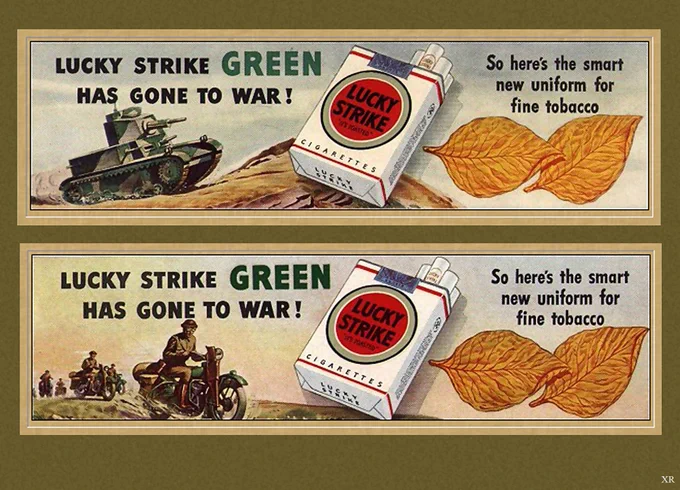Just got down reading todays Post-Dispatch 9/6 (link https://bloximages.newyork1.vip.townnews.com/stltoday.com/content/tncms/assets/v3/eedition/5/c9/5c92ed5d-c794-522f-ae68-0f7ec4f493bf/64f7647d20932.magnified.jpg) if doesn’t work, google stltoday.com), where master propogandist/manipulator Edward Bernays, working for Beechnut (in those days, meat purveyor) asked 4000 doctors to support big breakfasts vs light, voilà bacon and eggs. Also pushed bananas as health food. He also worked for Lucky Strike. Unfortunately, he became master "psychologically manipulator (his parents were related to Freud). “He called that concept “the engineering of consent.” And it was his belief that the public represented chaos and that only skilled propagandists such as himself could bring them to order through the systematic manipulation of their thoughts.”
In a similar fashion another breakfast staple, orange juice, was marketed to us after orange growers were having a hard time selling their surplus of oranges. So they invented instant OJ and pushed the idea of drinking it as part of a well balanced breakfast. Another marketing manipulation that became standard breakfast practice.
Bing Crosby was instrumental in promoting Minute Mai, especially the frozen concentrated. They started sponsoring him in the late 1940s, paying him partly in shares in the company. He became an advocate, personally appearing in commercials for them for over thirty years.
Numerous sources confirm the OP’s story, like the one below, although they may all have originated from the same place – not that I’m doubting it. But I’ll offer a couple of my own additional hypotheses, because PR alone, no matter how effective, is unlikely to achieve such a widespread and long-lasting phenomenon unless it’s also helped along by underlying fundamentals.
First of all one might note that, as often happens, the story is America-centric. The English – at least the upper classes who could afford it – have enjoyed traditional full breakfasts for centuries (while the poorer classes had to make do with porridge and the like). These full breakfasts would consist of some or all of things like kippers, bacon, eggs, sausages, beans, fried tomatoes, fried mushrooms, and more. Thus the idea of a full breakfast that included bacon and eggs is centuries old.
Back in America, it’s unlikely that Americans would still be favouring a breakfast diet that some doctors a hundred years ago told them was good for them, unless there were other good reasons to do so. Among those is that there’s good reason to believe that the morning meal should be substantial – after all, the word “breakfast” itself derives from the idea of breaking the overnight fast. And the farther one departs from that, the stronger the evidence that it’s bad for your health; in particular, eating little or nothing during the day and then splurging on a big dinner in the evening is bad both for general health and for maintaining healthy body weight.
One might ask, then, if eating a substantial breakfast is a good idea, could not Bernays at least be credited with making bacon and eggs the favoured choice? Maybe to some extent, but note that Brits have been doing it for centuries. My own pet theory is that when one is still in the semi-groggy state of waking up, a breakfast centered around enticing simple comfort foods has strong advantages over other options. Eggs are a tasty but mild comfort food, and the aromatic flavours of smoked bacon are a perfect match. Pork sausages or smoked ham also work. Hash browns and buttered toast are added because, IMHO, they also have comfort food qualities. Just my humble conjectures.
Diamonds for engagements has a very similar history. An early case of very successful marketing. De Beers ad campaign of the 1930s. Before this Sapphires, Rubies & Emeralds were far more popular.
Then in the 70s Anita Bryant became the face and voice of Florida orange juice. As a kid I had no idea who she was other than being the “orange juice lady” (she had been a former Miss America contestant with a moderately successful singing career). Her orange juice commercials were a fixture throughout that decade.
But by the 80s her career shilling OJ came to a crashing halt when she started a virulently anti-gay campaign.
I thought of that too while reading the OP. Another classic marketing manipulation was Alka-Seltzer. They used to package it differently, and people would only use one tablet at a time. Then some marketing ‘genius’ got the brilliant idea to put the tabs in packages of two and market the dosage that way. There was the highly successful “plop plop, fizz fizz, oh what a relief it is” campaign to drive home taking two tabs at a time, which really did nothing different than taking one, except for an instant doubling of sales.
Bernays is probably most remembered for his tobacco propaganda. Women, so the story goes for the most part in those days did not smoke. At least, not in public. From a marketing standpoint expanding the customer base from a male activity into both sexes makes good sense. He cleverly incorporated smoking cigarettes into a campaign of equivalence of women’s rights - advertising them as “Freedom Sticks”. It’s tough not to become cynical when looked at that way.
You’ve come a long way, Baby!
actually, the article pointed out how 'supposedly" women smokers didn’t like Luckies because the red and white packaging clashed with their clothes ![]() Really??
Really??
There’s another good marketing story around “Lucky Strike”. In 1942 the rather dated drab green package was redesigned to red and white, with the logo now appearing on both sides of the package. The design was the work of famed industrial designer Raymond Loewy, who had once claimed that the design of something simple like a cigarette package was far more challenging than the design of more complex objects precisely because the options were so limited, and he charged accordingly.
The new design was introduced with a lie – that the design was to help the war effort by eliminating the copper used to make green ink (the green was actually made with chromium). It was actually to modernize the look, specifically to make it more attractive to women, and also to reduce printing costs.
Of course in 1942 their ad agency was still Sterling Cooper.
So how many Americans are actually eating bacon and eggs with orange juice for breakfast? I know that TV shows always depict a family that has a full breakfast on the table every morning (although no one ever eats more than a bite of toast), but in my experience, the vast majority of people shovel something quick into their mouths before (or while) heading out the door. Even in retirement, the only time I cook a full breakfast is the occasional Sunday morning if we have houseguests. The stereotypical cooked breakfast is something I get at a restaurant, usually on vacation.
The invention of ‘Fish and Chips’ is credited to a fellow named Joseph Malin. In fact he only popularized the name of a dish that already existed. The restaurant he started in London exists to this day, Malin’s of Bow Street is than name I recall. He was an imagrant to England, often said to be from Russia but likely his name came from the city of Malin in Ukraine, now spelled Malyn in the Ukrainian form. He could be related to me as that seems to be the origin or my last name. I found this out as a delightful coincidence during my venture as a seafood restaurant proprietor where Fish and Chips was our top seller.
Didn’t notice it mentioned before, the origin of Kellogg’s Corn Flakes and other breakfast cereals has been associated with the lowering prices of horse feed as ‘horseless buggies’ and other means of transportation developed.
I, for one, am grateful to our breakfast manipulating overlords.
True for me, as well. Growing up we only had the “big” breakfast on Sundays after mass. Sometimes, we had pancakes instead of bacon and eggs. But I haven’t regularly eaten bacon and eggs at home since then. Not at all in probably well over ten years.
My standard breakfast at home is had on both workdays and non-workdays. Since I’m often leaving for work long before dawn, it is designed for both nutrition and ease & speed of production:
- 1 or 2 poached eggs
- 1 large serving of plain yogurt
- 1 small slice of whole-grain toast with lotsa PB
- 1 small serving of fruit, usually berries
No, there’s no bacon or other breakfast meat in it. But it is protein & fat heavy, not carb heavy. I can be eating that within 4 minutes flat of setting foot in the kitchen. It takes longer to eat than it does to cook. And it dirties exactly two utensils: the egg bowl and a spoon, so cleanup is nearly instantaneous too. Anyone who says they don’t have time to cook a hot breakfast on a workday isn’t trying very hard.
Breakfast out will have more of the usual breakfast meat. Today in fact that was 2 eggs over easy, bacon plus Canadian bacon, berries, and 1/2 slice of wholegrain toast.
So I at least eat a cooked breakfast substantially every day whether home or out. Or at least a breakfast with some cooked components.
I eat bacon and eggs 2 or 3 times a week now. Mainly because the costs aren’t high and I have the time to prepare them. Bacon has been on sale steadily for while at a tolerable $5 a pound, and despite lingering high prices somewhere I’m getting large white eggs for $1.99 a dozen. That makes me a nice breakfast for about $2.50 counting the butter and a possible piece of toast. Filling and nourishing enough that I won’t need a substantial lunch later.
LSMFT! ![]()
It isn’t hard. I just don’t feel like going through the bother (and the clean up) of a full bacon and eggs breakfast. I usually have yogurt or an English muffin. But I’m not working anymore. When I worked, I’d get breakfast in the company cafeteria and eat it at my desk --usually a breakfast burrito or on Wednesdays chilaquiles.
I eat cold cereal with a lot of milk, and berries if I have them. And I brew myself a nice pot of tea. Oh, and I eat some fiber capsules with a large glass of water.
I suppose I could poach an egg in the time it takes me to heat the water for tea. But eating eggs is messy, and if I expect to have a regular lunch, I don’t really want to eat a lot for breakfast.
On vacation, when I might not want to take time out for lunch, or might not find something I like, I eat a larger and more leisurely breakfast. I also tend to gain weight on vacation.

